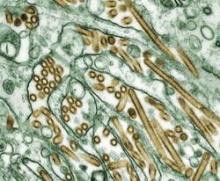Cross-contamination of nonpathogenic avian influenza with a highly pathogenic H5N1 strain should not derail preparations for the upcoming influenza season, the Centers for Disease Control and Prevention announced July 11.
"We are confident that we will be able to get the flu lab reopened in time to do the essential work it does, like helping to prepare the influenza vaccinations for Americans and tracking the spread of flu around the world and around the country," CDC Director Dr. Tom Frieden said in a press conference. "We don’t see any risk to keeping the lab closed until we have a full assessment of what happened and we are sure that we can prevent future occurrences."
The CDC closed the influenza lab after Dr. Frieden learned that the cross-contamination of the sample had occurred, a revelation he called "distressing" since the cross-contamination was identified by USDA researchers on or about May 23. The CDC confirmed that the contamination occurred within its labs.
"We are still just beginning the investigation to determine how this happened," he said. "The work was done in one room. That leads to some early hypotheses of what might have happened, but it is going to take a detailed investigation and we may not know for certain exactly what happened, but we will do everything we can to find out." The agency said there were no exposures as a result of the incident.
The revelation came as the CDC released a report on its investigation into a June 5 incident of unintentional release of potentially viable anthrax within its Roybal Campus in Atlanta.
The agency attributed that incident to the use of unapproved sterilization techniques, the transfer of materials not confirmed to be inactive, the use of pathogenic Bacillus anthracis when nonpathogenic strains would have been more appropriate, inadequate knowledge of peer-reviewed literature, and a lack of standard operating procedure or process on inactivation and transfer to cover all procedures done with select agents in the Bioterrorism Rapid Response and Advanced Technology Laboratory.
None of the staff potentially exposed has become ill with anthrax, the agency said.
As a result of these incidents, the CDC issued a moratorium on the movement of dangerous biological agents, including infectious agents and active or inactivated specimens, from its labs. The moratorium will remain in place pending review by an advisory council. Dr. Frieden also called on a review of the agency’s safety culture to ensure that events like these don’t happen again.
CDC also announced that six undocumented vials of smallpox were discovered on the Bethesda, Md., campus of the National Institutes of Health. Dr. Frieden said that the vials were dated Feb. 10, 1954 – before the eradication of smallpox. He said they were not created with any malicious intent.
"The problem was not in the creation of the materials, but in inventory control which allowed them to remain unsecured for decades," Dr. Frieden said. "They should have been destroyed decades ago, and once we complete [testing on them] we will destroy them."


